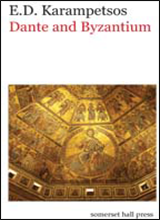Dante and Byzantium
E. D. Karampetsos
ISBN 978-1-935244-02-8
About the Book
No other writer has succeeded as extravagantly as Dante in putting a face on the invisible. Thanks to his inheritance from Byzantium, Dante possessed a wealth of visual resources, a means of organizing them, and a theoretical justification for their use. One discovers in Dante an extended network of Byzantine influences—St. John of Damascus, St. John Climacus, Plotinus, the Pseudo-Dionysius, and others. In this book, E.D. Karampetsos uncovers the profound influence of Byzantine theology, art, and ideas on Dante and his writing.
Praise for the Book
"E. D. Karampetsos’s book Dante and Byzantium provides a long-overdue introduction to the influence of Byzantine art and thought on Dante's work and more broadly on the artists of the Italian Renaissance. Dante's gaze must have rested many times on the mosaic of the Last Judgment in the Baptistery of San Giovanni where he was baptized. Karampetsos argues persuasively for the Baptistery as a major source of inspiration for the vivid visual imagery of the Divine Comedy, and points to the flow of Byzantine philosophy, religious thought, and art into 12th century Tuscany. The importance of Byzantium to the development of the Italian Renaissance has been largely ignored by western scholars. Karampetsos's book is timely, persuasive, and written in clear, accessible prose that should attract a broad readership for this neglected and fascinating study of the Byzantine influences in Dante's work."
—Gail Holst-Warhaft, Cornell University
"What strikes anyone fortunate enough to encounter E. D. Karampetsos’s treatise Dante and Byzantium is the author’s extraordinary ease in moving among his pantheon of authors of many lands in many times. Like the author who summarizes Karampetsos’s level of comfort in encountering his sources, be they church fathers, Dante himself, or the omnipresent Kazantzakis, Karampetsos helps himself without a trace of embarrassment to the best and most pertinent of what each author has to offer. Karampetsos assumes that his readers will find in all his authors the same eagerness to help that he does. The testimonies of many ages and many lands come to his hand ready and even eager to illuminate his quest after the real Dante."
—MaryMulhern, Brookside Institute
About the Author
E. D. Karampetsos, has a PhD in Comparative Literature from the City University of New York Graduate School (1978), and teaches in the English Department of the College of Southern Nevada. He has taught at The Bourguiba Institute of the University of Tunis; Deree College in Athens, Greece; Birzeit University in the West Bank; King Faisal University in Saudi Arabia; and Kuwait University. He has published short fiction and articles about contemporary drama and modern Greek culture and literature in: The Hellenic Journal, Pilgrimage, Coffeehouse, Greek Accent, Grammata ke tehnes, Film Quarterly, World Literature Today, The Journal of Evolutionary Psychology, The Journal of Modern Greek Studies, Abhath Al-Yarmouk, Comparative Literature Studies, The Literary Half-Yearly, Forkroads, Dialogue and Reason, The Looking Glass, The Journal of the Hellenic Diaspora, The Red Rock Review, Mondo Greco, Post-Postmodern Review, Odyssey, Greece in Print, and The Charioteer. He has co-edited a translation, adaptation, and introduction to the seventeenth-century Greek play The Sacrifice of Abraham which appeared at Lycabettos Press (Athens, Greece) in 1989. His book on modern European drama, The Theater of Healing, published by Peter Lang, appeared in 1995. He co-authored "The Greeks," a chapter in the anthology Peoples of Las Vegas: One City, Many Faces (2005). Pella Press will be publishing his On the Way to Ithaca, a collection of essays and articles.

